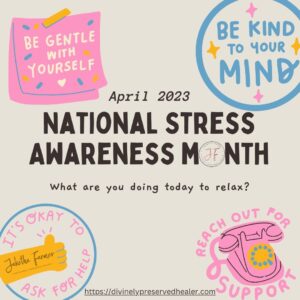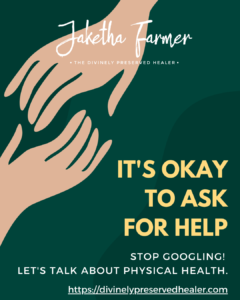Due to the hectic pace of modern life, it has become increasingly difficult to avoid stressful situations in and out of the home. Common sources of stress include financial hardships, issues at work, unsuccessful relationships, and familial obligations. Individuals from all stages of life experience stress to varying degrees. However, while we do not usually think of stress in a positive light, we often fail to examine the physical toll it takes on our bodies and, if left unaddressed, could lead to physical manifestations of illness in our physical bodies.
A certain stress could trigger any number of diseases in one person, and be rather harmless to another….” ~Hans Selye
Physical Symptoms of Stress

Stress can result in a number of physical ailments. One of the most widely reported is insomnia. Why is this? – because individuals experiencing stress frequently have difficulty falling or staying asleep. Over time, this can lead to fatigue, which impacts one’s ability to concentrate or focus.
Acute stress, a short-term response to agitating or alarming stimuli, can also trigger panic or asthma attacks in those predisposed to such. Other physical manifestations of stress include headaches, digestive problems, muscular pain, and chest achesóall of which have the potential to disrupt our everyday performance in the home or workplace.
One facet of stress involves anxiety, which is “an umbrella term for a cluster of daunting feelings that can be difficult to cope with, like fear, worry, restlessness, and stress” but don’t affect one’s ability to carry on with daily duties. A few of these include a racing heart or heart palpitations, shortness of breath or throat tightness, constant exhaustion, trouble sleeping, muscle tightness, soreness, and pain, decreased or increased appetite, nonstop nervous sweating, shakiness or trembling, easily startled, and irregular periods. Aside from these generalized symptoms, a few others are clearly linked to specific physical sicknesses and ailments specifically immune system issues and stomach discomfort.
How Can Chronic Stress Affect You?
Pairing either of these two with an increase or decrease in appetite ushers in a recipe for G.I. distress. Emotional eaters tend to overconsumption on junk and sugary foods, leading to a host of life-threatening conditions, if ignored, On the other hand, there are those whose overstimulated or suppressed emotions that trigger digestive distress in the form of stomach pain, constipation, diarrhea, excessive gas, and bloating. IBS or irritable bowel syndrome falls into this area and usually involves a combination of these distresses, which could be triggered by the occurrence of the event or later on. Now, we are moving to the arena of chronic stress.
Chronic stress is the outcome of a prolonged state of emotional distress. Symptoms of chronic stress include backaches, abdominal soreness, disrupted sleep, and migraines. More worryingly, chronic stress can increase one’s risk of developing more serious long-term physical disorders. It can heighten one’s chance of developing cardiovascular disease, a leading cause of death in many countries. It has also been found to aggravate heart disease symptoms and can contribute to the risk of stroke and hypertension. Likewise, the immune system can also be hampered by chronic stress. Studies have found that, after an extended period, chronic stress weakens the immune system leaving it more susceptible to illnesses.
Mindfulness and Stress
The good news is that there are many ways to manage stress. As we proceed through this month – April is National Stress Awareness Month, we’ll cover this and other techniques in greater detail. But for now, mindfulness is the art of directing one’s focus to the present and serves as a strong aid in the battle against stress. Mindfulness can take many forms. Yoga, meditation, walking, and deep breathing exercises are all great stress-relieving practices. Just need to find your preferred method and use it to help reduce your stress levels.
Mindfulness helps combat stress by improving one’s ability to concentrate, confront and control thoughts about stressful situations, productively and beneficially. Rather than attempting to ignore or suppress feelings of stress, mindful acknowledgment and management of one’s concerns and frustrations is the key to a healthier life. In our next article, we will cover foods that can help you better mange your stress level. But until then, share your thoughts in the comments section below. #dphealer
Need Professional Help?!?
 If you or someone you are experiencing chronic stress to the point he/she/they are struggling emotionally, please seek out a trusted friend, family member, or other licensed mental health professional. If immediate help is needed, call 911 or use one of the trusted sources.
If you or someone you are experiencing chronic stress to the point he/she/they are struggling emotionally, please seek out a trusted friend, family member, or other licensed mental health professional. If immediate help is needed, call 911 or use one of the trusted sources.
988 Suicide & Crisis Lifeline
Call or text 988; Llame al 988 (para ayuda en español)
Use Lifeline Chat on the web (English only)
The Lifeline provides 24-hour, confidential support to anyone in suicidal crisis or emotional distress. Call or text 988 to connect with a trained crisis counselor.
Veterans Crisis Line
Use Veterans Crisis Chat on the web
The Veterans Crisis Line is a free, confidential resource that connects veterans 24 hours a day, 7 days a week, with a trained responder. The service is available to all veterans and those who support them, even if they are not registered with the VA or enrolled in VA healthcare.
Disaster Distress Helpline
Call or text 1-800-985-5990
The disaster distress helpline provides immediate crisis counseling for people experiencing emotional distress related to any natural or human-caused disaster. The helpline is free, multilingual, confidential, and available 24 hours a day, 7 days a week.






